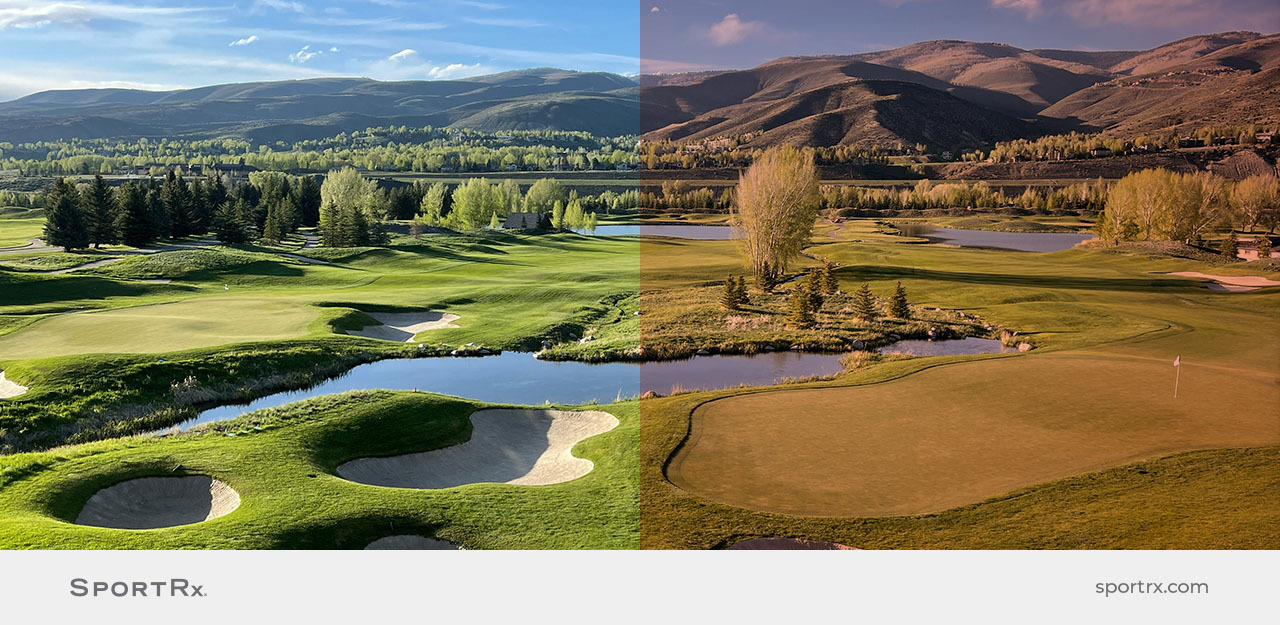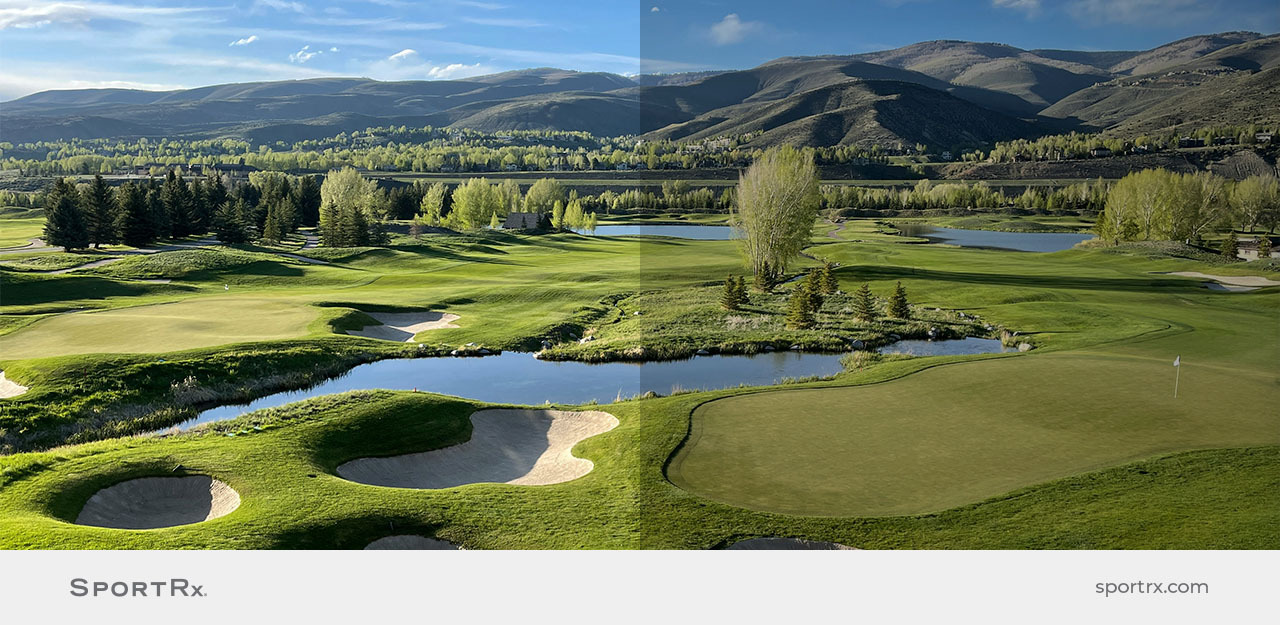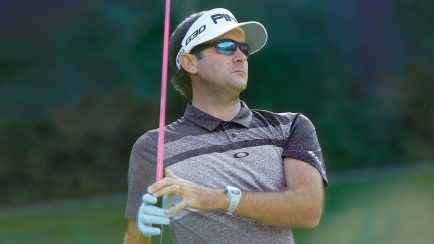Like the rest of your equipment, your golf sunglasses serve a special purpose on the course. It might seem like a small detail, but lenses do more than just protect your eyes. The best lenses for golf boost your precision and accuracy. If you’ve been using your regular sunglasses on the course, check out how you can change your game by wearing the best lens color for golf.
In This Post
Best Lens Color for Golf Video
The Best Color of Lenses for Golf
Brown
Rose
Lens Colors to Avoid in Golf Sunglasses
Gray
Green
More Golf Sunglasses Features
Polarized Lenses
Mirror Coatings
Transition Lenses
What to Look for in Golf Frames
Shop the Best Lens Colors for Golf Sunglasses at SportRx
Best Lens Color for Golf Video
Watch Sports Optician, Tyler, as he shows examples of each recommended tint in the video below, or keep reading for our full breakdown.
The Best Color of Lenses for Golf
The best lens colors for golf are warm tints like brown and rose colors. Amber and copper tints will also do the trick. These are our top recommendations, but the most important thing to consider in your golf lenses is contrast enhancement. Golf courses are full of color, and the better your contrast is, the easier it will be to see your ball, read the green, and make your swing more accurate.
Let’s take a closer look at tint options and how they differ.
Brown
Brown lenses deliver excellent color contrast with brightness protection in golf sunglasses. It’s a versatile tint that works well in any climate or weather and keeps your surroundings fairly true to-color. With more color density than lighter hues like rose or copper, it’s a better choice for golfers who like a more shaded view. Brown and bronze lenses have a lower visible light transmission, or VLT, but still boost color saturation for a warm, pleasant view with comfortable coverage.
Rose
Rose tinted lenses offer more color intensity than brown for golf sunglasses. They also work well for variable lighting conditions, but have a higher VLT and not as much brightness protection as brown. Of course, you can add a mirror coating to help offset glare, which we’ll get into more later. This tint is a great choice for the golfer who wants the richest contrast and doesn’t mind a rosy hue or more light passing through their lenses. Rose lenses are also a tried-and-true tint for a range of sports, so they’re great for the golfer who wants to get a lot of use out of one pair.

Before and after with a rose base tint.
Lens Colors to Avoid in Golf Sunglasses
It may come as a surprise, but there are a few tints we recommend avoiding in your golf sunglasses, and we’ll explain why. Since ball tracking is a key concern, you should avoid wearing lens tints that don’t serve this need. This is why many regular, everyday sunglasses won’t help you on the course; most casual sunglasses have lenses with the tints below. There are a few exceptions, of course, but here are our overall suggestions on which lenses to avoid.
Gray
Gray lenses are perfect for everyday use when your eyes need maximum brightness protection and color distinction isn’t a priority. It’s perfect for neutralizing colors or when you simply want a darker view. However, this could hinder you on the golf course. One potential exception is when a gray lens is layered with a solid blue mirror, which can create soft contrast with a mild amber tone. If your eyes are sensitive to light, this base tint and mirror coating combination could work well for you. If you don’t fall into that category, we suggest opting for brown or rose lenses.

Before and after with a gray base tint.
Green
Green lenses often have an amber base tint with a solid green mirror. While they do better than a gray lens on the golf course, they don’t offer as much contrast as a brown or rose base tint. They also tend to have a lower light transmission, which is perfect for brightness coverage but not exactly when you need detail in your surroundings. This can lead to a flatter, more muted appearance.
More Golf Sunglasses Features
Now that we’ve got the base tints down, let’s get into a few other features to think about on your golf sunglasses. These are optional ways to customize your pair, and our Sports Opticians aim to save you time with our tips on each one.
Polarized Lenses
The next big question after the best lens color for golf is—are polarized lenses good for golf? The short answer is: it depends. One key benefit is glare reduction, which makes it easier to focus around water traps and other highly reflective surfaces. If you’re light sensitive, you also might prefer maximum glare protection. In this sense, they benefit the golfer by keeping your eyes more comfortable throughout the day. However, they can interfere with your game by altering depth perception.
Polarized lenses are so great at blocking glare that they can actually mute “helpful” glare on the course, such as the shine from the grass that helps you read undulations in the green. Even so, there are highly popular golf sunglasses that are only available with polarized lenses. These are fan favorites and have been for decades, such as the Maui Jim Ho’okipa. The choice to go polarized or not ultimately comes down to individual preference.
Mirror Coatings
Mirror coatings are mostly cosmetic additions to your golf lenses, but they can also add a darkening effect and sway color perception. This depends on the mirror opacity and color. Soft mirror coatings are called “flash” mirrors, and they offer a subtle reflective appearance. A solid mirror adds a small amount of glare protection and can increase or offset the effects of your base tint. For golf sunglasses, our Sports Opticians suggest steering clear of solid black or silver mirrors. These can darken your lenses enough to lower the light transmission and neutralize color perception, which won’t help you spot your ball.
Transition Lenses
Transition lenses are lenses that start clear or mostly clear and darken with UV exposure. Also called photochromic lenses, these are perfect for the golfer who wants to be prepared for any type of lighting condition. It can take up to 30 seconds for your lenses to darken, and a little longer for them to lighten. What we love about Transition lenses is that many of them are offered in—you guessed it—brown and rose tints! Not only are these great for the golf course, you can use them for other sports and keep them on indoors or anywhere else you go. Like having eyeglasses and sunglasses in one set of lenses, Transition lenses are especially ideal for prescription wearers.
What to Look for in Golf Frames
Now that we’ve covered the lenses, let’s make sure they’re set in the right frames. Your frames should be made of a durable, lightweight material that you’ll love wearing round after round. It’s best to stick with a weather-resistant nylon for this versus a metal or acetate frame, which can get uncomfortable after hours of wear. Second, make sure you check for rubber detail on the nose pads and temples—but especially on the nose pads. This keeps your golf sunglasses from sliding down as you’re addressing the ball. Rubber grip also keeps them in place on warmer days when your concentration is working up a sweat.
We cover these topics and a lot more in our Golf Sunglasses Buyer’s Guide.
Shop the Best Lens Colors for Golf Sunglasses at SportRx
Find everything you’re looking for in the best pair of golf sunglasses at SportRx! We’re proud to offer the most customizable eyewear experience, no matter what your vision needs are. Let your next pair be the tool that propels you into your best game.
Shop confidently knowing that your order is backed by our See Better Guarantee. This gives you 45 days to try your golf sunglasses on the course. If you’re not fully pleased with them, simply let us know and we’ll be happy to set up a refund or exchange for a better pair—no strings attached! We even offer free domestic shipping both ways.
Contact us to get started!





